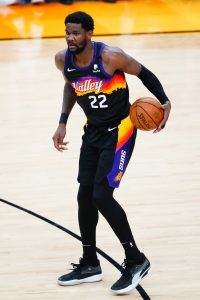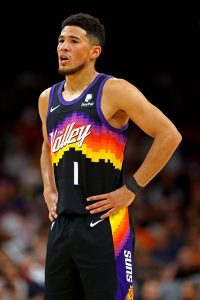Although the Suns finished the 2019/20 season by winning eight straight games, it was still their sixth straight season under .500, so when they followed it up by going 51-21 and making the NBA Finals in ’20/21, it came as a major surprise.
That ’20/21 performance put the Suns firmly in the conversation as contenders heading into ’21/22, meaning they didn’t catch anyone off guard with another hot start last fall. But not many league observers expected that hot streak to essentially last the entire regular season, as the club took yet another significant step forward by winning an NBA-high 64 games.
Phoenix’s rise came to an abrupt halt in the second round of the postseason, when the team failed to slow down Luka Doncic and fell to the underdog Mavericks in seven games. It cast a shadow over what was otherwise a terrific year and raises questions about where the club goes from here.
Are more roster upgrades needed to seriously contend for a title, or was this a championship-caliber team that just had a bad series? And how will Chris Paul‘s age, Deandre Ayton‘s free agency, and the ongoing investigation into team owner Robert Sarver‘s alleged workplace misconduct factor into the Suns’ outlook going forward?
The Suns’ Offseason Plan:
 Let’s start with Ayton, the Suns’ only core player who isn’t already under contract for the 2022/23 season. He’ll be eligible for restricted free agency this offseason after failing to agree to an extension with the team last fall. Even though Phoenix was unwilling to give Ayton a five-year, maximum-salary contract a year ago, there had long been an expectation that the two sides would have an easier time reaching an agreement this summer — if not a max deal, then something very close to it.
Let’s start with Ayton, the Suns’ only core player who isn’t already under contract for the 2022/23 season. He’ll be eligible for restricted free agency this offseason after failing to agree to an extension with the team last fall. Even though Phoenix was unwilling to give Ayton a five-year, maximum-salary contract a year ago, there had long been an expectation that the two sides would have an easier time reaching an agreement this summer — if not a max deal, then something very close to it.
However, since the night the Suns were eliminated from the playoffs – in a Game 7 in which Ayton was benched after playing just 17 minutes – one report after another has suggested that the big man’s return to Phoenix won’t be a foregone conclusion after all. Multiple reporters have identified the former No. 1 overall pick as potentially the biggest name to change teams this summer.
Ayton’s free agency will be fascinating for a few reasons. For one, despite the fact that the Suns apparently aren’t enthusiastic about paying Ayton $30MM+ per year on his next deal, all of those aforementioned reports have been adamant that the team won’t just let him walk away for nothing and will look to negotiate a sign-and-trade deal.
Given that so few teams have the ability to create enough cap space to sign Ayton outright, perhaps that’s how his free agency will play out. But it would be fascinating to see how Phoenix would respond if a rival suitor signs Ayton to a four-year max offer sheet. Would the Suns match it and plan on potentially trading Ayton down the road, despite the fact that his salary would put them well over the luxury tax line for the time being? The potential for a game of free agency “chicken” here is intriguing.
If the Suns do engage in sign-and-trade talks for Ayton, those negotiations will be complicated by the fact that base year compensation rules will apply to his new contract. On a maximum-salary deal, Ayton’s outgoing salary from Phoenix’s perspective would be just $15.25MM, while his incoming salary for a new team would be $30.5MM. Bridging that gap and making sure both teams are adhering to the NBA’s salary-matching rules will be tricky if Ayton’s new team is over the cap.
It’s virtually unprecedented for a free agent of Ayton’s caliber to accept his qualifying offer rather than negotiating a longer-term contract, but no player coming off a rookie scale contract has ever been eligible for a qualifying offer as lucrative as Ayton’s ($16.4MM), so it’s worth mentioning as a fallback option. If he were to accept that one-year QO, Ayton would be eligible for unrestricted free agency in 2023. It’s a long shot, but if the Suns play hardball with possible sign-and-trade partners and Ayton decides he doesn’t want to stay in Phoenix, it’s an option.
Based on the reporting to date, it sounds like the Suns’ preferred outcome would be to replace Ayton with a starting-caliber player earning in the $15-20MM range and to not spend maximum-salary money on their starting center. We’ll see if the right opportunity arises – for both Ayton and the Suns – to make that happen.
While resolving Ayton’s contract situation will be their top priority, the Suns will have to address their backup slots at point guard and center, where Aaron Holiday, Elfrid Payton, JaVale McGee, and Bismack Biyombo are all eligible for free agency. How Phoenix approaches those spots will depend in part on whether Ayton returns — or possibly on how much salary the team takes back in an Ayton sign-and-trade.
Sarver doesn’t have a reputation as an owner who spends big on player salaries and likely won’t be particularly enthusiastic about going deep into tax territory, so if Phoenix projects to be a taxpayer, I’d count on the team filling out its depth chart at point guard and center primarily with minimum-salary signings. If Ayton doesn’t return, the club would have more flexibility below the luxury tax line, opening the door to use its mid-level exception and perhaps to re-sign players like Holiday and McGee, who should command more than the minimum.
Devin Booker, Cameron Johnson, and Dario Saric are among the other Suns worth keeping an eye this offseason.
Booker qualified for a super-max contract extension when he made an All-NBA team this spring. If the Suns put a super-max offer on the table, it would add four more years to the two remaining on his current deal, starting at 35% of the 2024/25 cap. Even if we project a relatively conservative $130MM cap for ’24/25, that super-max contract would be worth in excess of $50MM per year.
There’s no guarantee the Suns move forward on that extension immediately, but it would cover Booker’s prime years (starting with his age-28 season) and Paul’s contract would be coming off the books by that point, so it would make sense for the two sides to get it done this summer.
Johnson will be eligible for a rookie scale extension this offseason and has probably earned a deal at least in the range of what fellow sharpshooter Kevin Huerter got from Atlanta a year ago (four years, $65MM). The Suns don’t necessarily have to push to finalize an agreement with Johnson before the 2022/23 season, since he’d be a restricted free agent next summer. But if they can get a relatively team-friendly price, like they did with Mikal Bridges, it’s worth pursuing.
Saric, meanwhile, will be returning from a torn ACL as he enters the final year of his contract. His $9.2MM expiring deal makes him a logical trade candidate, either in a salary-dump deal or in a package for a rotation player. However, at least one recent report suggested Phoenix is hopeful Saric can return to form as a frontcourt piece who can stretch the floor, and may not be looking to move him after all.
Salary Cap Situation
Note: Our salary cap figures are based on the league’s latest projection ($122MM) for 2022/23.
Guaranteed Salary
 Devin Booker ($33,833,400)
Devin Booker ($33,833,400)- Chris Paul ($28,400,000)
- Mikal Bridges ($20,100,000)
- Jae Crowder ($10,183,800)
- Landry Shamet ($9,500,000)
- Dario Saric ($9,240,000)
- Cameron Payne ($6,000,000)
- Cameron Johnson ($5,887,899)
- Torrey Craig ($5,121,951)
- Total: $128,267,050
Player Options
Team Options
Non-Guaranteed Salary
Restricted Free Agents
- Deandre Ayton ($16,422,835 qualifying offer / $31,582,375 cap hold): Bird rights
- Aaron Holiday ($5,791,702 qualifying offer / $11,941,653 cap hold): Bird rights
- Ish Wainright ($1,816,044 qualifying offer / $1,816,044 cap hold): Non-Bird rights
- Total (cap holds): $45,340,072
Two-Way Free Agents
Draft Picks
Extension-Eligible Players
Note: These are players who are either already eligible for an extension or will become eligible before the 2022/23 season begins.
- Devin Booker (veteran)
- Jae Crowder (veteran)
- Cameron Johnson (rookie scale)
- Dario Saric (veteran)
Unrestricted Free Agents / Other Cap Holds
Offseason Cap Outlook
With $128MM in guaranteed money committed to nine players, the Suns will, at the very least, operate over the projected $122MM cap in 2022/23.
The Ayton situation will dictate whether they end up over the projected tax line ($149MM) as well, but that looks like a good bet at this point — even if Ayton doesn’t return, Phoenix could end up taking on upwards of $20MM in salary in a sign-and-trade deal.
Cap Exceptions Available
- Taxpayer mid-level exception: $6,392,000 1
Footnotes
- This is a projected value. The Suns could instead have access to the full mid-level exception ($10,349,000) and bi-annual exception ($4,050,000) if they remain below the tax apron.
Salary and cap information from Basketball Insiders and RealGM was used in the creation of this post.
 Let’s start with Ayton, the Suns’ only core player who isn’t already under contract for the 2022/23 season. He’ll be eligible for restricted free agency this offseason after failing to agree to an extension with the team last fall. Even though Phoenix was unwilling to give Ayton a five-year, maximum-salary contract a year ago, there had long been an expectation that the two sides would have an easier time reaching an agreement this summer — if not a max deal, then something very close to it.
Let’s start with Ayton, the Suns’ only core player who isn’t already under contract for the 2022/23 season. He’ll be eligible for restricted free agency this offseason after failing to agree to an extension with the team last fall. Even though Phoenix was unwilling to give Ayton a five-year, maximum-salary contract a year ago, there had long been an expectation that the two sides would have an easier time reaching an agreement this summer — if not a max deal, then something very close to it.